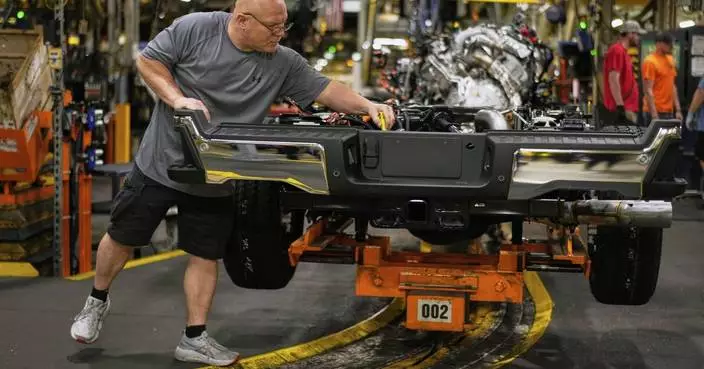SUNNYVALE, Calif.--(BUSINESS WIRE)--Apr 22, 2025--
Jumio, the leading provider of automated, AI-driven biometric identity verification, risk signals and compliance solutions, today announced general availability of Cross-Transaction Risk, which helps businesses proactively detect fraud by connecting identity elements across the Jumio network.
This press release features multimedia. View the full release here: https://www.businesswire.com/news/home/20250422401203/en/
A key capability within the Jumio Identity Reputation suite, Cross-Transaction Risk enables organizations to strike the ideal balance between advanced fraud detection, seamless user experience and identity assurance. Traditional identity verification validates a user’s identity at a single moment in time, often when they are opening an account or conducting a transaction. Jumio Identity Reputation delivers deeper, ongoing intelligence by analyzing identity attributes and behaviors, starting at the signal level and evolving into real-time, network-powered recognition.
At the center of this evolution is the Jumio network, a privacy first, cross-customer intelligence network built on over 32 million known identities from both legitimate and fraudulent transactions. Many providers operate as data processors, which means they can only use fraud data to stay compliant with consumer privacy regulations such as GDPR. Jumio meets more stringent data privacy requirements and leverages both legitimate and fraudulent identity data with explicit end-user consent. This gives Jumio customers unmatched visibility into identity behavior and risk across Jumio’s ecosystem. To date, more than 400 Jumio customers have joined and are contributing to the unmatched strength of the Jumio network.
Cross-Transaction Risk is already making a significant impact, uniquely detecting an average of 28% more fraud attacks among enabled customers using the capability during early release. One such customer, a major APAC telco, faced a sophisticated, large-scale fraud attack in which fraudsters repeatedly used camera injection attacks and deepfake selfies in an attempt to open new accounts. Cross-Transaction Risk complemented existing fraud defenses and instantly detected the attack, uniquely rejecting over 50% of fraudulent ID transactions and adding a powerful additional layer of protection beyond traditional fraud controls for the customer.
“By connecting this vast amount of proprietary identity data and intelligence across customers, sessions and time, the Jumio network enables earlier fraud detection, faster onboarding for trusted users, and continuous monitoring of evolving risk,” said Jumio Chief Product and Technology Officer Bala Kumar.
To learn more about Jumio and its award-winning, AI-powered solutions, visit jumio.com.
About Jumio
Jumio helps organizations to know and trust their customers online. From account opening to ongoing monitoring, the Jumio Platform provides advanced identity verification, risk signals and compliance solutions that help you accurately establish, maintain and reassert trust.
Leveraging powerful technology including automation, biometrics, AI/machine learning, liveness detection and no-code orchestration with hundreds of data sources, Jumio helps you fight fraud and financial crime, onboard good customers faster and meet regulatory compliance including KYC and AML. Jumio has processed more than 1 billion transactions spanning over 200 countries and territories from real-time web and mobile transactions.
Based in Sunnyvale, California, Jumio operates globally with offices and representation in North America, Latin America, Europe, Asia Pacific and the Middle East and has been the recipient of numerous awards for innovation. Jumio is backed by Centana Growth Partners, Great Hill Partners and Millennium Technology Value Partners.
For more information, please visit www.jumio.com.


Jumio Network Harnesses Power of Proprietary Data to Advance Fight Against Identity Fraud
CAXIUANA NATIONAL FOREST, Brazil (AP) — Deep in silence, as if under a spell, children watch intently as Bacuri, a young Amazonian manatee, glides around a small plastic pool. When he surfaces for air, some of them exchange wide smiles. The soft rustle of rainforest leaves punctuated by bird song adds to the magic of the moment.
The children from riverside communities traveled for hours by boat just to meet Bacuri at the field station of the Emilio Goeldi Museum, Brazil’s oldest research institute in the Amazon. Despite their endangered status, manatees are still hunted and their meat illegally sold, and they are increasingly threatened by climate change. Environmentalists hope that by engaging local communities, Bacuri and others like him will be spared.
The Amazonian manatee is the region’s largest mammal but is rarely seen, much less up close. The reasons for this are twofold: The manatee has acute hearing and will vanish into the murky water at the slightest sound; and its population has dwindled after being overhunted for hundreds of years, mostly for its tough hides that were exported to Europe and Central America.
To help the manatee population recover, several institutions are rescuing orphaned manatee calves, rehabilitating them and reintroducing them to the wild.
Bacuri weighed just 22 pounds (10 kilograms) — a fraction of the more than 900 pounds (400 kilograms) of an adult manatee — when he was rescued and taken to the museum's research center in the federally protected Caxiuana National Forest. He was named after the local community that found him. Two years and several thousand milk bottles later, Bacuri has grown to about 130 pounds (60 kilos).
Three institutions are responsible for his care. The Goeldi Museum provides facilities and educates nearby communities. The federal Chico Mendes Institute for Biodiversity Conservation assigns two staffers for 15-day shifts to feed Bacuri three bottles of milk a day as well as chopped beets and carrots, and clean the pool every 48 hours. The nonprofit Instituto Bicho d'Agua— meaning institute of water animals in Portuguese — oversees veterinary care, dietary planning and caregiver training.
During their visit, the children learn that female manatees are pregnant for about a year then nurse their young for two more, feeding them from nipples behind their front flippers — the manatee equivalent of armpits. This long reproductive cycle is one reason the manatee population has not recovered from the commercial hunting that persisted until the mid-20th century.
They also learn the species is endangered and that they are the ones who must protect it.
“You are the main guardians,” biologist Tatyanna Mariúcha, head of the scientific base, tells the children, who spend the rest of the day drawing and making Play-Doh models of Bacuri.
With its auditorium, dormitories, observation towers, cafeteria and laboratories, the research station — two hours by speedboat from Portel, the nearest city — stands in stark contrast to nearby communities comprising clusters of wooden houses on stilts where families rely on cassava farming, fishing and harvesting açaí berries. School field trips and community outreach aim to narrow the gap.
“Caxiuana is their home,” Mariúcha told The Associated Press. “We can’t just come here and do things without their consent.”
Local knowledge will play a key role when Bacuri is finally released. He is the only manatee calf under care at Caxiuana. Once he has fully transitioned to a plant-based diet, he’ll spend time in a river enclosure before his release. That site will be selected based on where residents say wild manatees feed and pass through.
If all goes as planned, Bacuri will be the first released in the Caxiuana area. Two other calves rescued in poor health died in captivity, a sadly common outcome.
While subsistence hunting isn’t a major threat to the species, some fishermen still sell manatee meat illegally in nearby towns. Brazil banned hunting of all wild animals in 1967, with two exceptions: Indigenous peoples are allowed to hunt, and others can kill a wild animal to satisfy the hunger of the hunter or his family.
The threat of hunters has become harder to manage due to climate change, said Miriam Marmontel, a senior researcher at the Mamirauá Institute for Sustainable Development, hundreds of miles (kilometers) upstream along the Amazon River.
Dozens of dolphins died near Mamiraua in 2023, likely due to soaring water temperatures during a historic drought. Manatees avoided mass mortality then because they typically inhabit deep pools during the dry season, but recent droughts have dramatically reduced the water level, making manatees more vulnerable to poachers.
“As climate change accelerates, manatees may begin to suffer from heat stress too,” Marmontel said. “They also have a thermal limit, and eventually it may be crossed.”
That’s why reintroduction efforts are so important.
Around 60 rescued manatees are being cared for across the state of Para, where Caxiuana is located. Bicho d’Agua is caring for four in partnership with the Federal University of Para and Brazil's environmental agency. One of the four, named Coral, was found near Óbidos and airlifted 620 miles (1,000 kilometers) to the institute's facility in Castanhal. She arrived dehydrated and with severe skin burns, likely from sun exposure.
“The population has declined so much that every hunted animal impacts the species,” Renata Emin, president of Bicho d’Agua, told AP. “That’s why any effort matters, not just because one individual may return to the wild and help rebuild the population but because of the community and government engagement it inspires.”
The Associated Press’ climate and environmental coverage receives financial support from multiple private foundations. AP is solely responsible for all content. Find AP’s standards for working with philanthropies, a list of supporters and funded coverage areas at AP.org.
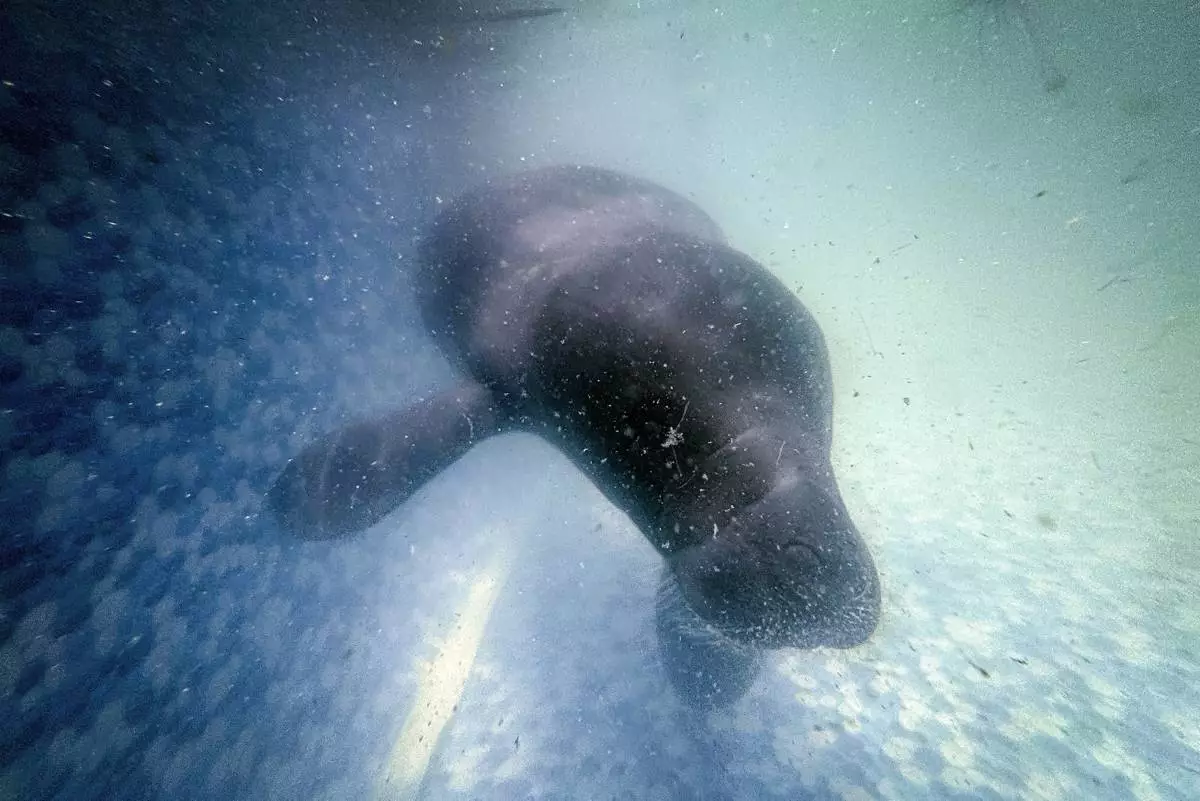
Maria, a rescued manatee, swims in a pool at the Bicho d'Agua project facilities in Castanhal, Brazil, Sunday, March 23, 2025. (AP Photo/Jorge Saenz)
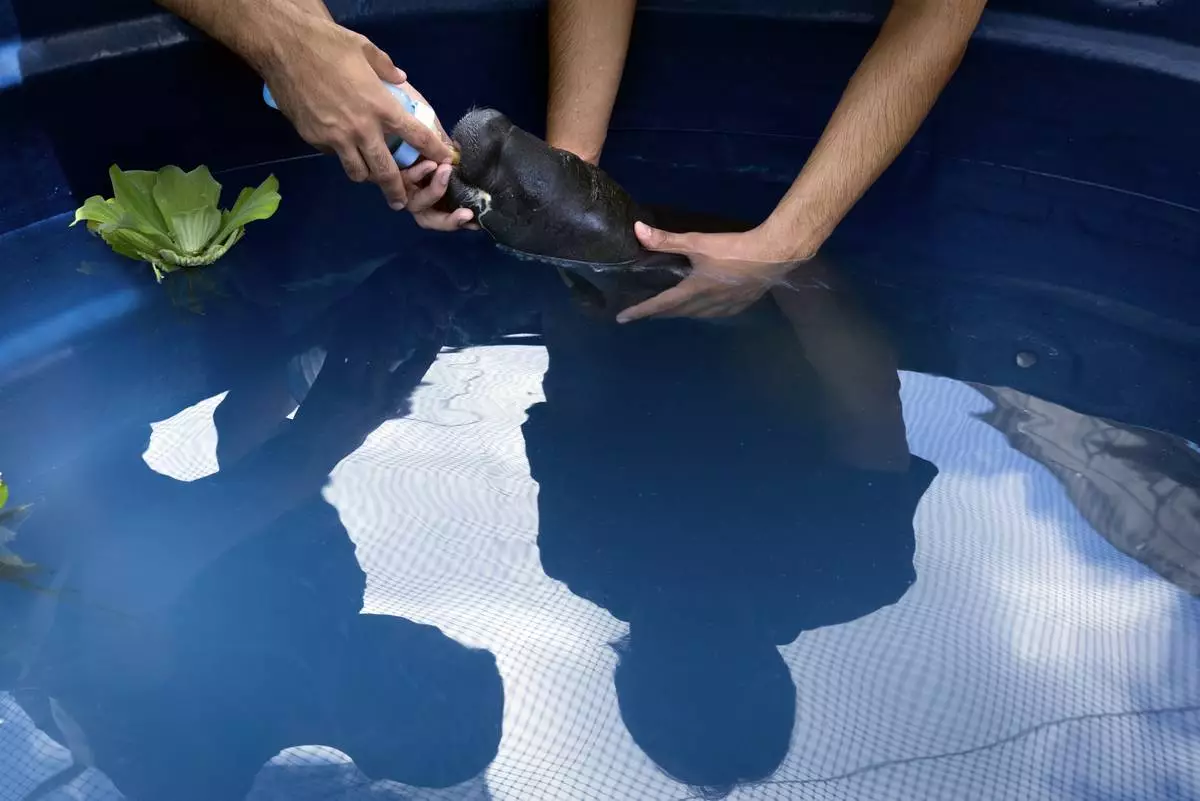
Coral, a rescued manatee, is fed while in a pool at the Bicho d'Agua project facilities in Castanhal, Brazil on Sunday, March 23, 2025. (AP Photo/Jorge Saenz)
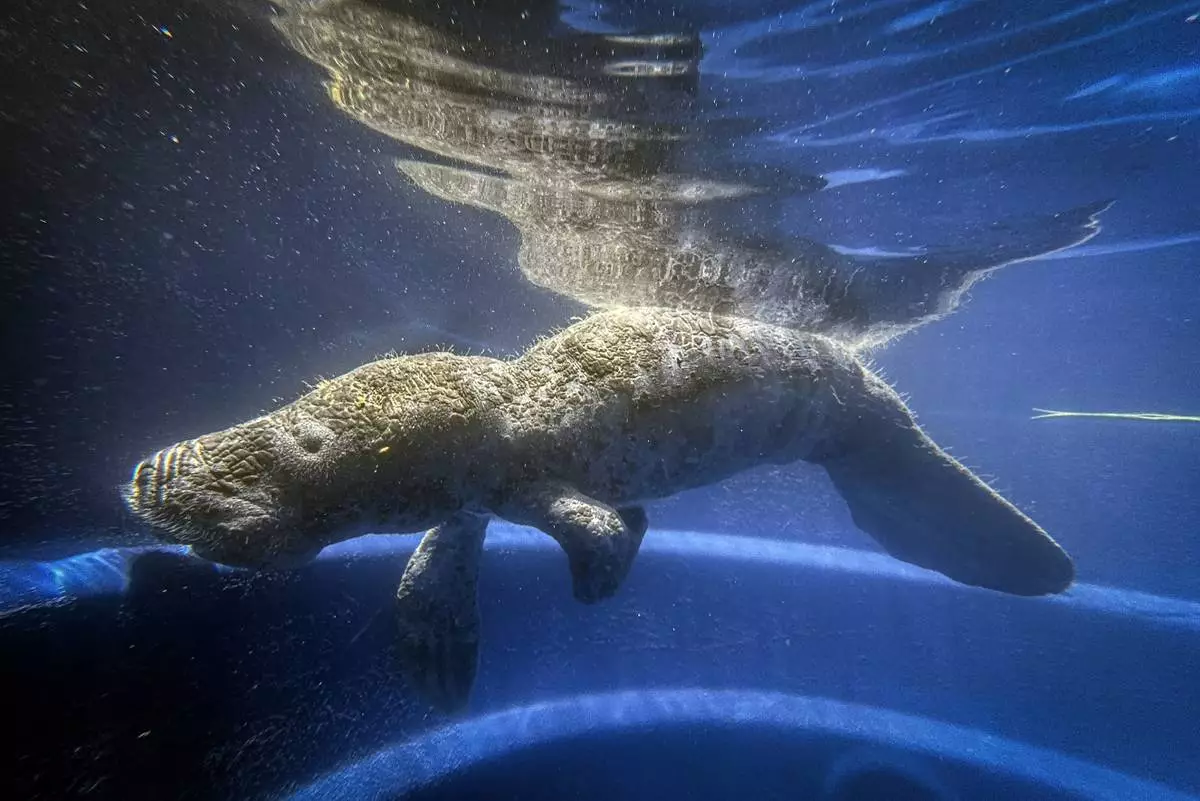
Coral, a rescued manatee, swims in a pool at the Bicho d'Agua project facilities in Castanhal, Brazil, Sunday, March 23, 2025. (AP Photo/Jorge Saenz)
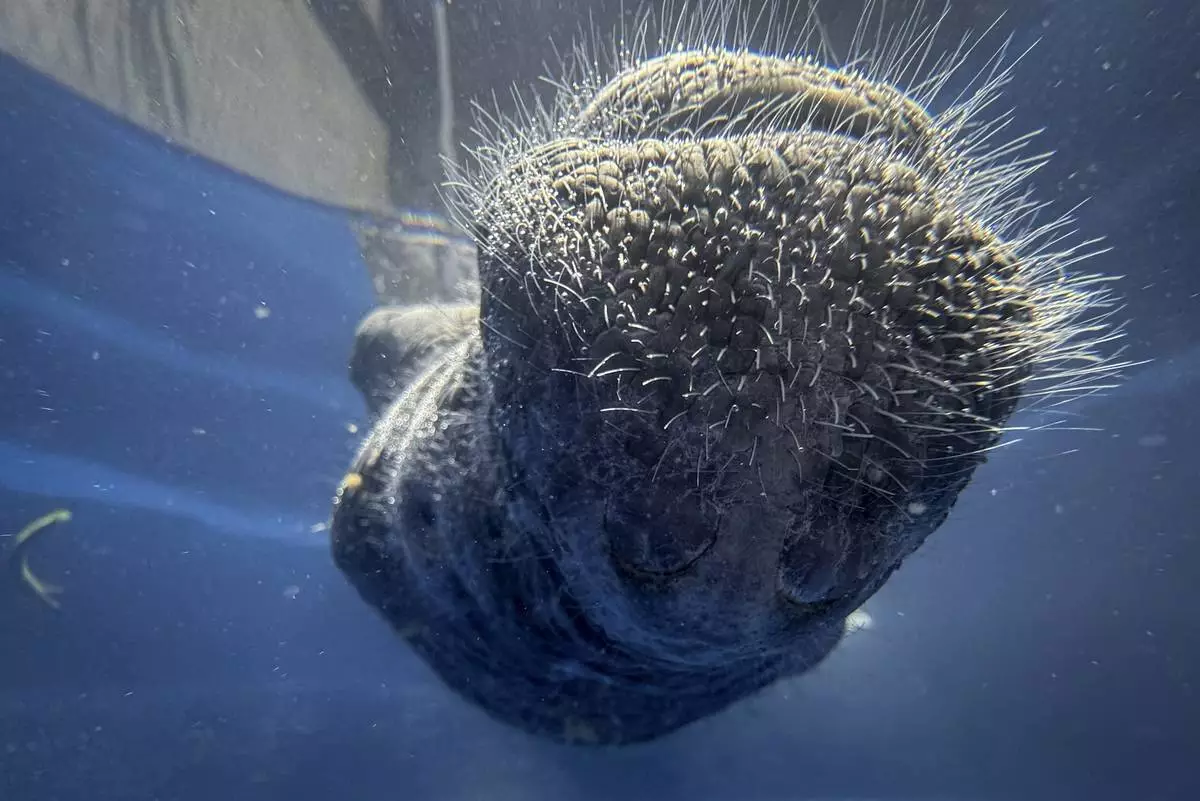
Coral, a rescued manatee, sleeps belly up in a pool at Bicho d'Agua project facilities in Castanhal, Brazil, Sunday, March 23, 2025. (AP Photo/Jorge Saenz)
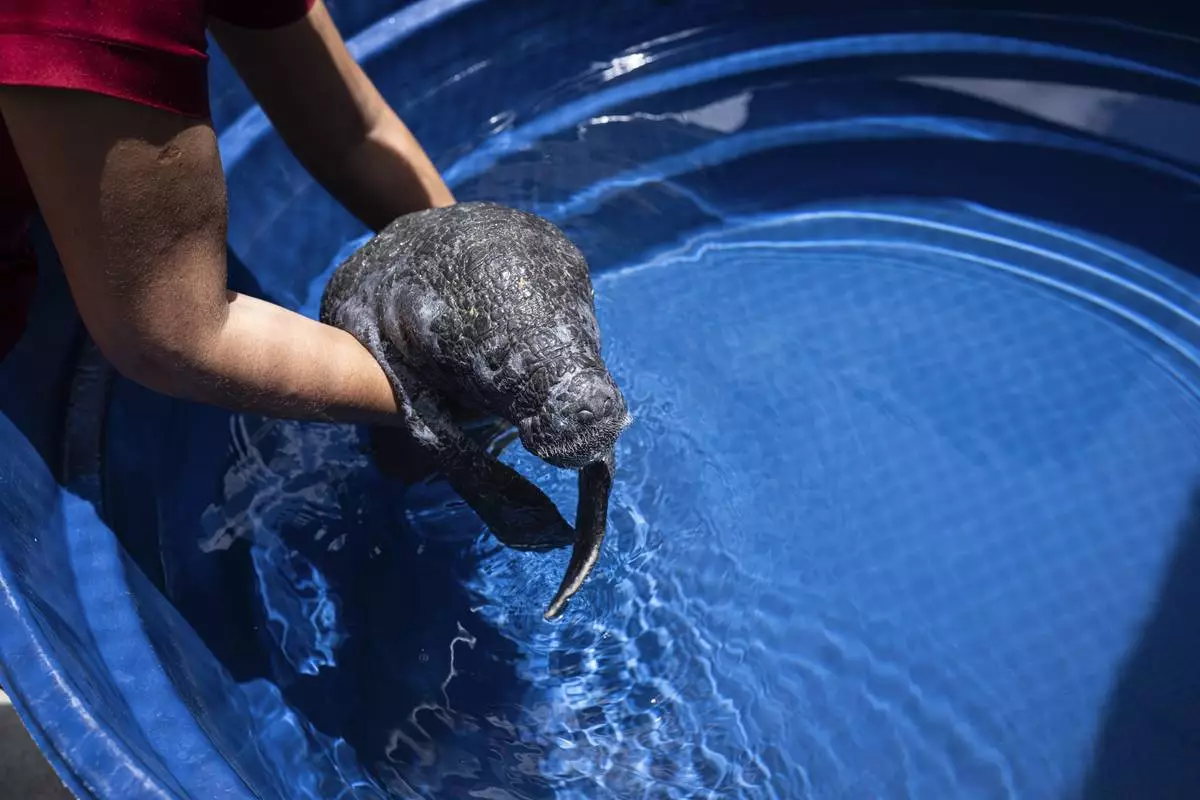
Coral, a rescued manatee, receives healing cream from an assistant at a pool at Bicho d'Agua project facilities in Castanhal, Brazil, Sunday, March 23, 2025. (AP Photo/Jorge Saenz)
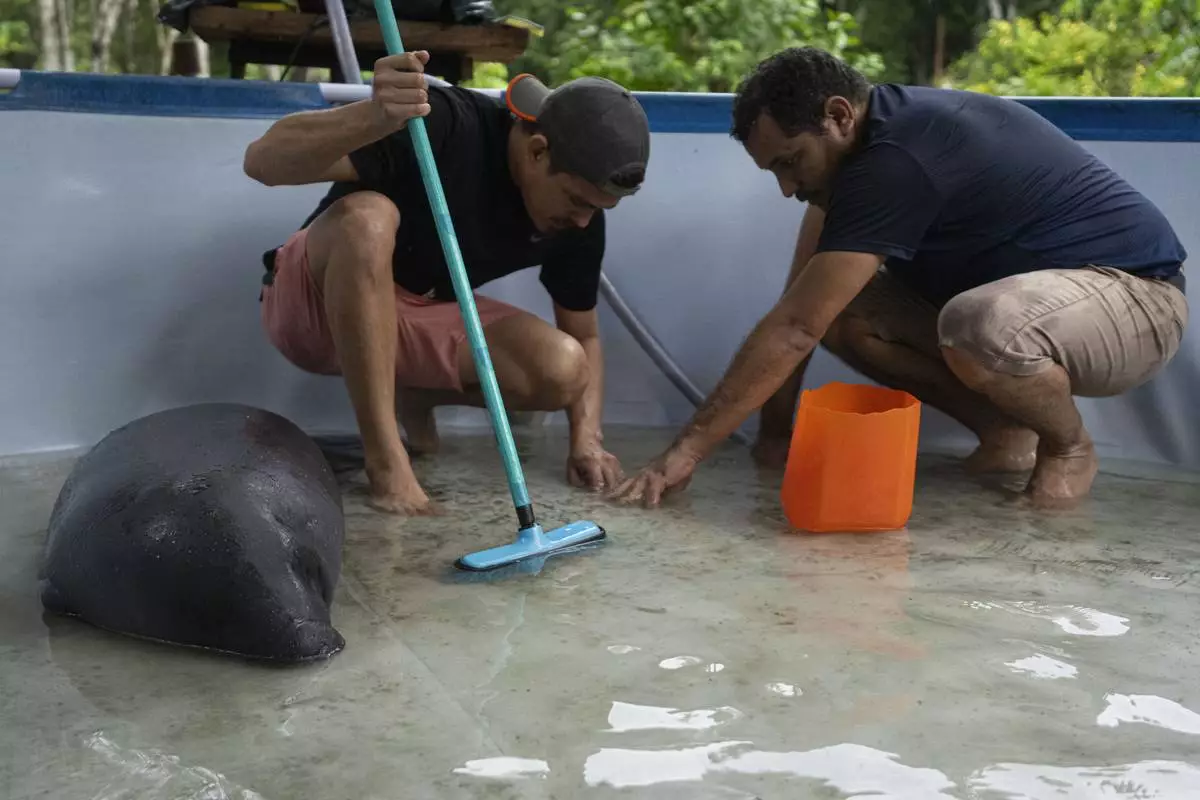
Workers clean a pool near Bacuri, a rescued manatee, at the Emilio Goeldi Museum's scientific station in Para state, Brazil, Thursday, March 20, 2025. (AP Photo/Jorge Saenz)
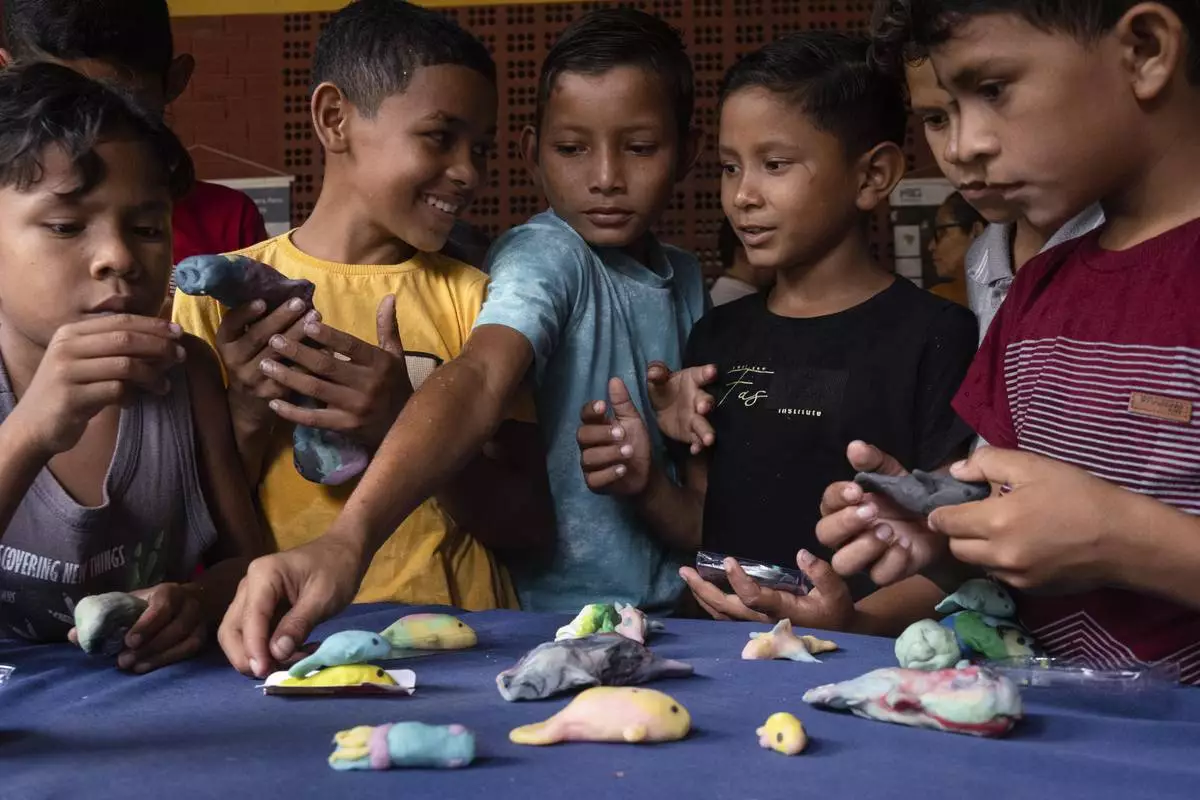
Children make manatee models out of Play-Doh during a trip to Emilio Goeldi Museum's scientific station in Para state, Brazil, Friday, March 21, 2025. (AP Photo/Jorge Saenz)
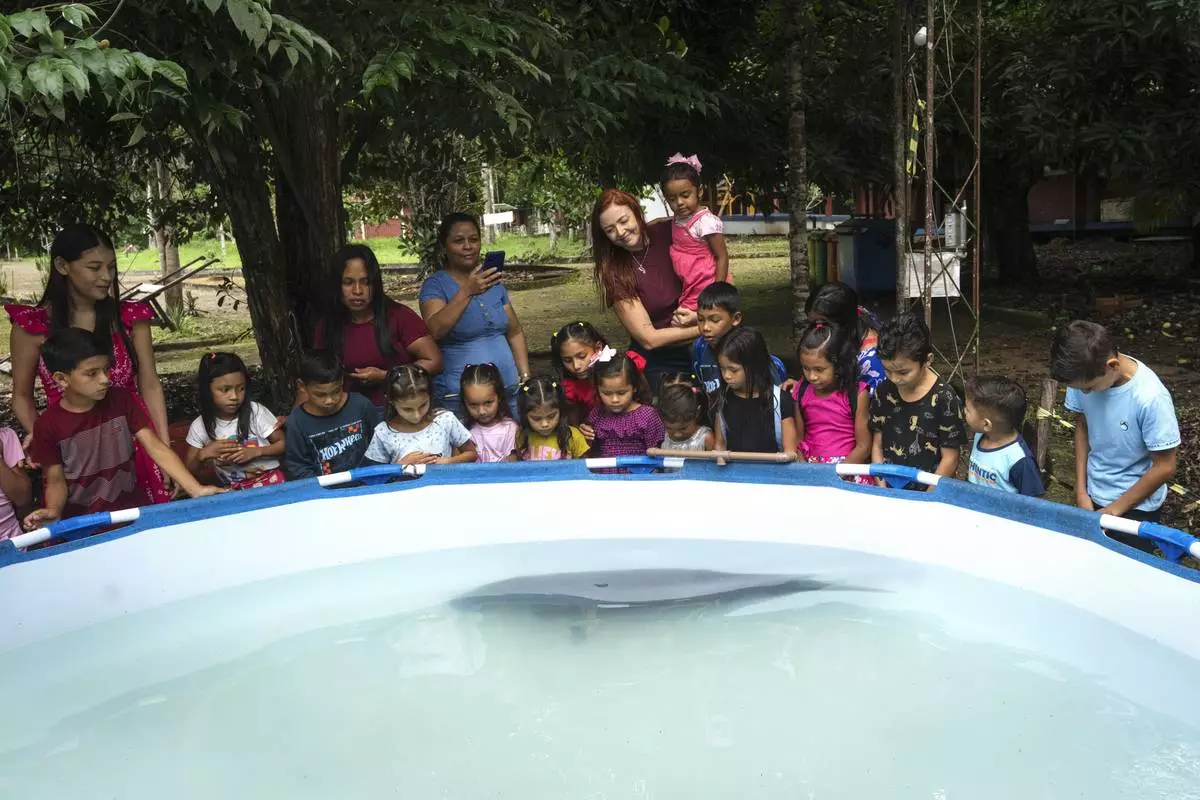
Bacuri, a rescued manatee, swims as children observe in the Emilio Goeldi Museum's scientific base at Caxiuana National Forest in Para state, Brazil, Friday, March 21, 2025. (AP Photo/Jorge Saenz)

A girl embraces biologist Tatyanna Mariúcha, head of the Emilio Goeldi Museum's scientific base, as children arrive at the station in the Caxiuana National Forest in Para state, Brazil, Friday, March 21, 2025. (AP Photo/Jorge Saenz)
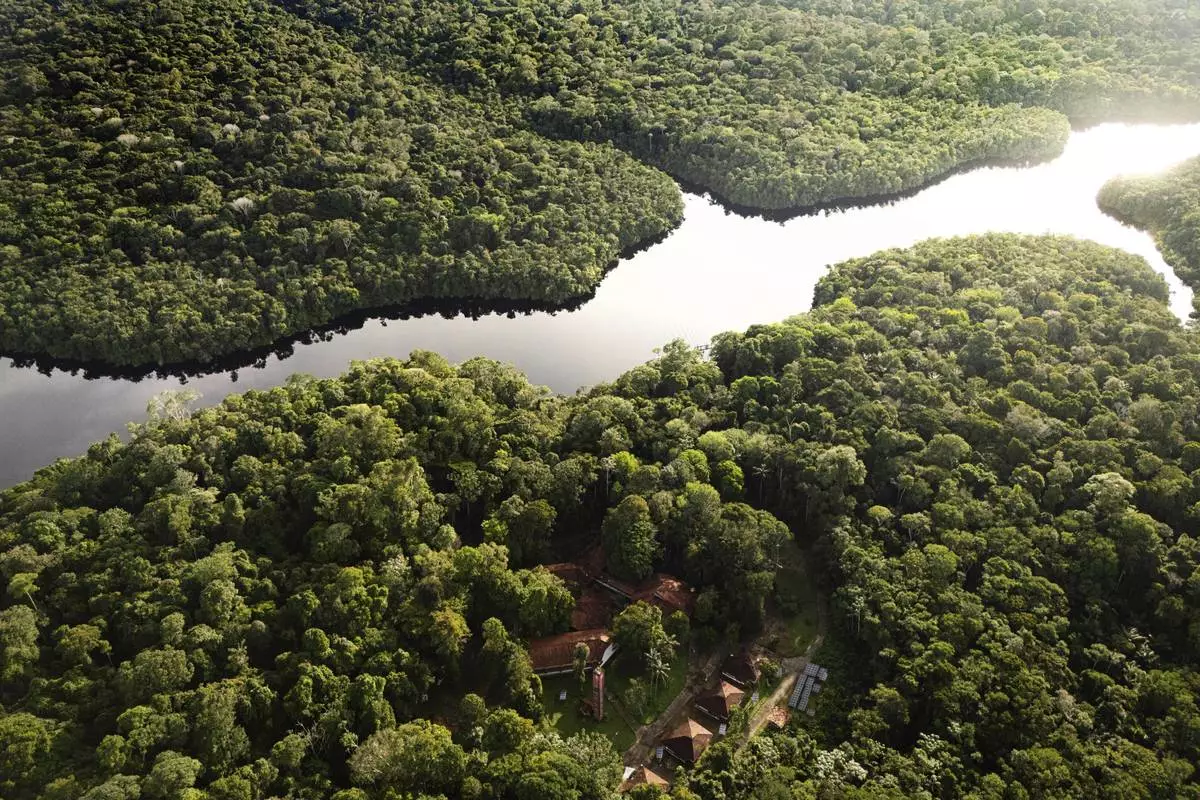
The Curua River crosses the Caxiuana National Forest with Emilio Goeldi Museum's scientific station at bottom in Para state, Brazil, Saturday, March 22, 2025. (AP Photo/Jorge Saenz)

Children arrive at the Emilio Goeldi Museum's scientific station in the Caxiuana National Forest in Para state, Brazil, Friday, March 21, 2025. (AP Photo/Jorge Saenz)
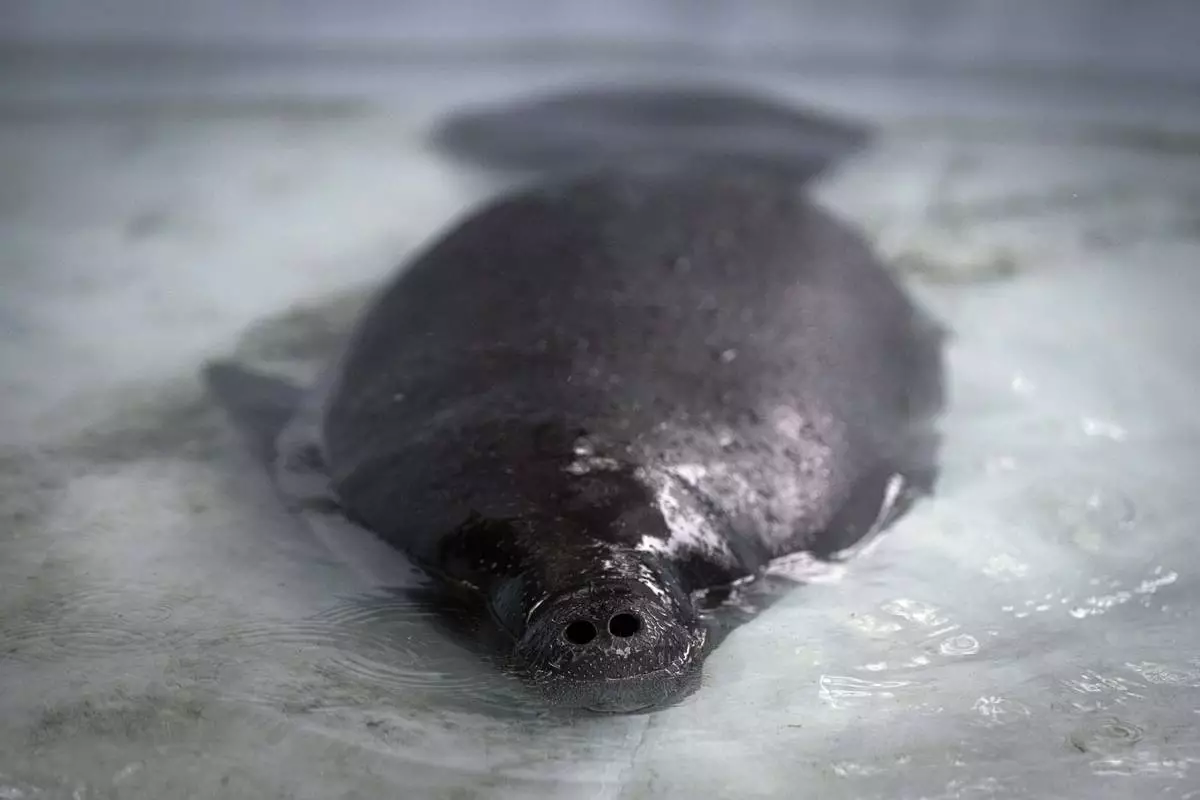
Bacuri, a rescued manatee, breathes while swimming in a pool at the Emilio Goeldi Museum's scientific station in the Caxiuana National Forest in Para state, Brazil, Thursday, March 20, 2025. (AP Photo/Jorge Saenz)



















